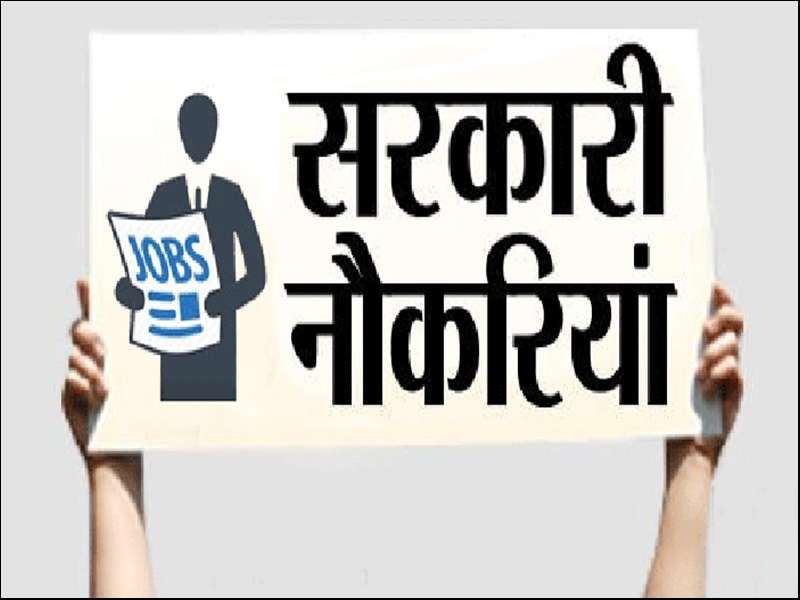This blog, “Sarkari Job ” is your comprehensive guide to navigate the labyrinthine world of government employment in India. From the appeal of Sarkari jobs to the diverse sectors they encompass, we’ll explore the intricate facets of securing these prized positions. We’ll delve into the types of government jobs available, where and how to find them, the application process, exam preparation, and interview strategies, while also addressing the importance of staying informed and adapting to the evolving landscape of government recruitment.

Types of Sarkari Jobs
Government jobs in India offer a diverse array of career options, catering to various interests, qualifications, and skill sets. These positions provide job security, competitive salaries, and the chance to make a significant impact on the nation’s development and well-being.
Civil Services:
The Indian Administrative Service (IAS), Indian Police Service (IPS), and Indian Forest Service (IFS) are prestigious civil service positions at the national level.
State-level civil services such as State Administrative Service (HAS) or State Police Service (HPS) offer similar roles at the state level.
Defense Services:
Join the Indian Army, Navy, or Air Force in various roles, including officers, soldiers, and technical staff.
Opportunities range from combat positions to administrative and medical roles.
Banking and Finance:
Secure jobs in nationalized banks, Reserve Bank of India (RBI), and financial institutions.
Positions include bank officers, clerks, and financial analysts.
Teaching and Education:
Become a government school teacher, college professor, or lecturer.
Opportunities are available at the primary, secondary, and higher education levels.
Healthcare:
Work as a doctor, nurse, or healthcare administrator in government hospitals and clinics.
Opportunities extend to public health agencies.
Engineering and Technical Services:
Join government departments as engineers, architects, and technical experts.
Roles vary from civil engineering to information technology.
Judiciary:
Pursue a career as a judge, magistrate, or legal officer within the judicial system.
Positions are available at district, state, and national levels.
Public Sector Undertakings (PSUs):
Secure jobs in government-owned companies in sectors like oil, energy, telecommunications, and manufacturing.
Roles encompass management, engineering, and technical positions.
Public Administration:
Work in various government departments and ministries as administrative officers, clerks, and support staff.
Roles involve policy implementation and administrative tasks.
Police and Law Enforcement:
Serve as a police officer, constable, or sub-inspector in state and central law enforcement agencies.
Roles range from maintaining law and order to criminal investigation.
Railways:
Join the Indian Railways as a station master, railway engineer, or technician.
Opportunities extend to a wide array of roles in the rail transport sector.
Forest and Environmental Services:
Contribute to conservation efforts by becoming a forest ranger, wildlife inspector, or environmental scientist.
Jobs involve protecting natural resources and wildlife.
Where to Find Sarkari Job Listings
Finding Sarkari job listings in India is crucial for anyone aspiring to work in the public sector. Here are some trusted sources to discover government job openings:
Government Job Portals: Websites like “sarkariresult.com,” “sarkarijobfind.com,” and “freejobalert.com” are popular destinations to find the latest job listings. These platforms categorize jobs by sector, location, and qualifications, making your search more efficient.
Official Government Websites: Many government departments and ministries have their official websites where they publish job vacancies. Examples include “ssc.nic.in” (Staff Selection Commission) and “upsc.gov.in” (Union Public Service Commission).
Employment News: The Employment News, available both in print and online, is a valuable resource that publishes government job advertisements, exam notifications, and application procedures.
State Public Service Commissions: Each state in India has its own Public Service Commission website, where they announce state-level job vacancies. For example, “bpsc.bih.nic.in” for Bihar.
Newspapers: Many government job openings are also published in daily newspapers, especially in the classified ads or career sections.
Job Search Apps: Mobile apps like “Sarkari Naukri,” “Government Job Search,” and “Sarkari Job Alert” provide job listings on your smartphone.
Make sure to visit these sources regularly, as Sarkari job listings are updated frequently. It’s essential to stay proactive and apply promptly to increase your chances of securing a government job in India.
How to apply for Sarkari jobs
Applying for Sarkari (government) jobs in India can be a rewarding but competitive process. Here’s a concise guide on how to navigate it effectively:
Research and Choose: Begin by researching the available government job openings. Assess your qualifications and interests to choose the positions that suit you best.
Check Eligibility: Review the eligibility criteria and qualifications required for the job. Ensure that you meet these requirements.
Complete Online Registration: Most government job applications are now submitted online. Register on the official website of the recruiting agency or department.
Fill Application Form: Complete the application form with accurate details. Double-check the information before submission.
Upload Documents: Scan and upload necessary documents, such as your educational certificates, identity proof, and a passport-sized photograph.
Application Fee: Pay the application fee if required. Keep the payment receipt for reference.
Submit and Print: Submit the application and save a printed copy for your records.
Stay Informed: Keep track of important dates, such as the release of admit cards, exam dates, and results.
Prepare for Exams/Interviews: If the selection process includes exams or interviews, start your preparation early.
Follow Up: Stay updated on the status of your application and any further instructions from the recruiting agency.
Remember to follow the specific instructions provided in the job notification. Applying for Sarkari jobs requires attention to detail, meeting deadlines, and continuous effort in your pursuit of a government career.

Preparing for Sarkari Job Exams
Preparing for Sarkari job exams requires dedication and a well-structured approach. Here are key steps to help you succeed:
Understand the Exam Pattern: Begin by thoroughly understanding the exam pattern, including the type of questions, duration, and marking scheme.
Gather Study Materials: Collect relevant study materials, such as textbooks, previous year question papers, and reference guides.
Create a Study Schedule: Develop a realistic study schedule that allocates time to cover all subjects and topics. Consistency is key.
Practice, Practice, Practice: Solve as many practice papers and mock tests as possible to build exam-taking confidence and time management skills.
Online Resources: Utilize online resources, including video tutorials, e-books, and online courses, to enhance your understanding.
Stay Healthy: Maintain a balanced lifestyle with adequate sleep, exercise, and a nutritious diet to keep your mind sharp.
Seek Guidance: Consider joining coaching classes or seeking guidance from experienced candidates to gain insights into exam strategies.
Revision: Regularly revise what you’ve studied to reinforce your knowledge.
Navigating Sarkari Job Interviews
Sarkari job interviews are notoriously competitive, but with careful preparation and execution, you can increase your chances of success. Here are a few tips to help you navigate Sarkari job interviews:
- Research the company and the position. The more you know about the company and the position you are interviewing for, the better prepared you will be to answer questions and demonstrate your qualifications.
- Practice answering common interview questions. There are a number of common interview questions that are often asked in Sarkari job interviews. Practice answering these questions in advance so that you can deliver clear and concise answers on the day of your interview.
- Dress professionally. First impressions matter, so make sure to dress professionally for your interview. This means wearing clean, well-fitting clothes that are appropriate for the workplace.
- Be on time. Punctuality is important in any job interview, but it is especially important in Sarkari job interviews. Make sure to arrive for your interview on time or even a few minutes early.
- Be confident and polite. Confidence and politeness are essential qualities for any Sarkari job candidate. Make eye contact with the interviewer, speak clearly and concisely, and be respectful of their time.
Staying Informed and Adapting
In the ever-evolving landscape of government employment, staying informed and adaptable is essential for Sarkari job aspirants. Continuous learning and skill development are not just buzzwords; they’re your ticket to long-term success. Here’s how to stay ahead:
Professional Development: Invest in courses, workshops, and certifications relevant to your field. Upskilling enhances your employability.
Policy Updates: Government policies and regulations change. Stay informed about these shifts to align your career goals accordingly.
Networking: Build professional networks within your sector. Attend conferences, webinars, and meet-ups to connect with like-minded individuals and mentors.
Mentorship: Seek guidance from experienced individuals in the field. Mentorship can provide valuable insights and career direction.
Adaptability: Be ready to embrace new technologies and working methods. Adaptability is a prized trait in the fast-paced government job landscape.
Tips for success in Sarkari job exams:
Know the Exam Pattern: Understanding the format of the exam is crucial. Get acquainted with the question types, marking scheme, and time constraints.
Create a Study Plan: Develop a structured study schedule that covers all subjects and topics. Allocate time wisely, giving more focus to your weaker areas.
Use Quality Study Material: Choose reliable and up-to-date study materials, including textbooks, online resources, and mock tests.
Practice Regularly: Consistent practice is key. Solve previous years’ question papers and take mock tests to enhance your problem-solving skills and time management.
Stay Informed: Keep up with current affairs, especially for exams that include a general knowledge section. Daily news updates and magazines can help.
Effective Revision: Periodic revision is vital. Summarize notes, create flashcards, and revise regularly to reinforce your memory.
Stay Healthy: Maintain a balanced diet, get enough sleep, and exercise to ensure your physical and mental well-being during the preparation.
Seek Guidance: Don’t hesitate to seek help from mentors, teachers, or coaching centers if needed. They can provide valuable insights and strategies.
Manage Stress: Keep stress under control through meditation, relaxation techniques, and positive thinking. A calm mind performs better.
Stay Organized: Organize your study materials, notes, and important documents. It reduces the chances of missing anything crucial.
Time Management: During the exam, manage your time wisely. Don’t get stuck on a single question; move on and return to it later if needed.
Believe in Yourself: Confidence in your abilities is essential. Stay motivated and believe that your hard work will pay off.
Conclusion
Sarkari jobs offer a number of advantages. Sarkari employees typically have job security for life, and they are entitled to a number of benefits, such as pension plans, health insurance, and paid leave. Sarkari jobs also provide an opportunity to serve the public and make a difference in the world.
FAQ's
To stay updated about upcoming Sarkari job exams, regularly check government websites, employment news, and dedicated job portals. Additionally, you can subscribe to email alerts or notifications from relevant authorities.
Eligibility criteria vary depending on the specific exam and the position. Typically, they include educational qualifications, age limits, nationality requirements, and sometimes experience. Detailed eligibility criteria are provided in the exam notification.
Effective preparation involves creating a study plan, using quality study materials, taking mock tests, and staying updated with current affairs. Seek guidance if necessary and practice time management. Maintaining a healthy lifestyle is also crucial.
Coaching classes are not mandatory, but they can provide structured guidance and valuable insights. Whether or not you need coaching depends on your confidence in self-study and the specific exam’s complexity.
Common mistakes include lack of a structured study plan, procrastination, not revising regularly, neglecting current affairs, and over-reliance on one subject. Effective time management and staying organized can help avoid these pitfalls.







